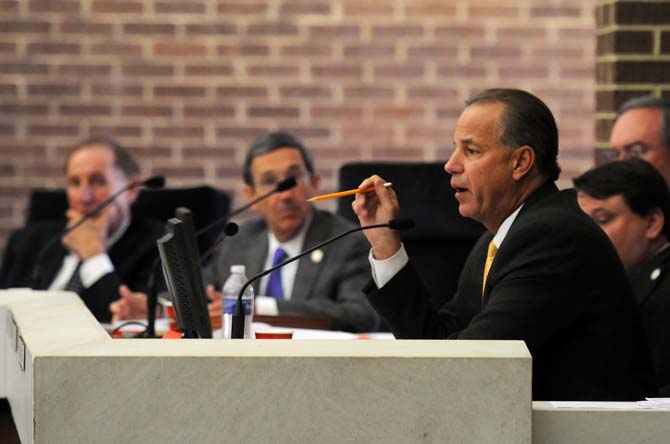The LSU Board of Supervisors voted unanimously Friday to approve renovations to University buildings and schematic designs for a new residence hall. The Board also voted to establish the Leveraging Innovation for Technology Transfer (LIFT) Fund and to transfer $2 million from an existing restricted account to the new fund.
The Board approved the design for a new residential facility on what is now the Hart Parking Lot. The facility will contain approximately 400 beds for on-campus students. The University has had a waiting list for the past few years, forcing the reopening of Kirby Smith Hall as a temporary solution, according to the recommendation. The project will cost approximately $25 million.
The Board of Supervisors also approved the reallocation of approximately $7 million from completed building projects to the renovation of Evangeline Hall and $5 million to a new Greek house. The recommendation took excess money from the East Laville and Residential College One projects to update Evangeline and excess from Annie Boyd’s renovation to build a new Greek house.
This reallocated money will combine with money designated by the 2013 state Capital Outlay Act to total about $22 million allocated to the Evangeline Hall renovation and $11 million allocated to the new Greek house.
The Board also authorized an agreement with the Tiger Athletic Foundation to demolish vacant apartments and build a temporary parking lot across from Tiger Stadium on Nicholson Drive.
The Board established the LIFT Fund, which will provide money to “fill the gap” between initial research grants and selling the product to businesses, said Nicole Baute Honorée, LSU System director of Research and Economic Development Initiatives.
The Committee on Technology Transfer’s report said technology transfer is how the University can commercialize inventions arising from research by members of the University and its affiliates.
Board member J. Steven Perry said the goal of the recommendations for technology transfer is a streamlined system for potential commercially viable inventions to maximize revenues and spur more invention.
Honorée said when faculty make inventions, it isn’t always clear whether the invention will be commercially viable. She said the money required, for example, if a prototype is needed is currently difficult to get.
The LIFT Fund will receive 5 percent of all future licensing income from inventions that the University system can
profit from.
The initial $2 million now allocated to the LIFT Fund was previously used to pay for patent fees, among other things, Honorée said. She said the first awards from the fund are
planned to be distributed as early as July.
The Board honored Robert “Razz” Rasmussen, assistant vice president for System Relations, who announced his retirement. Rasmussen worked for the
LSU System for 40 years, encompassing his entire professional career. Neither plans for a replacement nor a specific retirement date were announced at
the meeting.
Board of Supervisors approves new buildings
February 2, 2014
More to Discover








